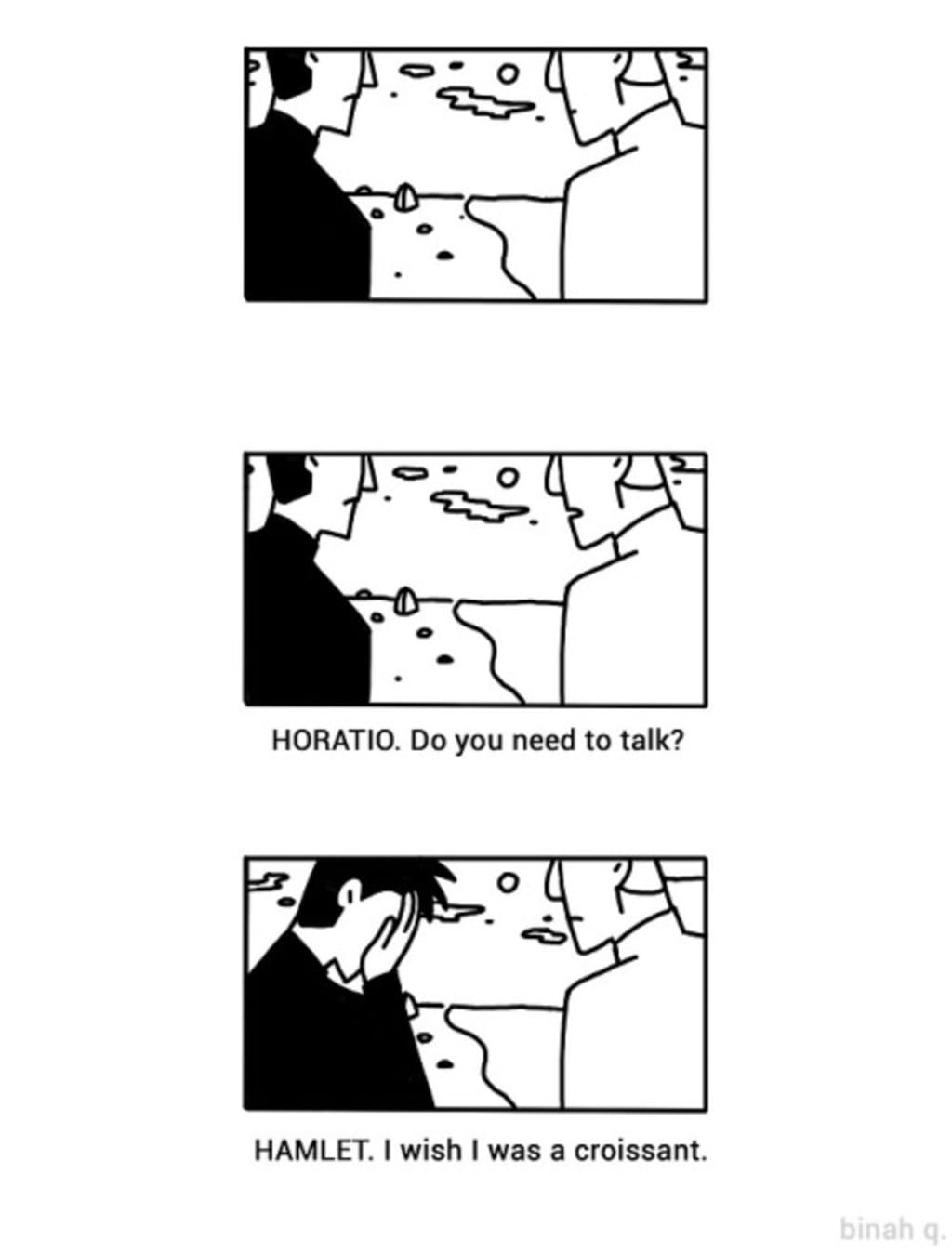The Evolution of Hamlet’s State of Mind
Is he going mad?

A teenager’s state of mind is not always as stable as it can be while going through a disastrous event, or even puberty. Everyone reacts differently when placed in bad situations. William Shakespeare’s tragedy titled Hamlet showcases how a teenager’s mindset can spiral out of control. The main character, a young prince, Hamlet, is in a predicament where multiple bad situations have occurred. Throughout the play, Hamlet’s state of mind goes on a rollercoaster. Hamlet’s state of mind goes through multiple changes as he experiences deception, struggles with self-reliance, and deals with grief.
Hamlet displays his feelings of deception very sarcastically in his Act 1 soliloquy. He also tries to find the culprit to his pain. His state of mind starts to become weak and insecure, as he processes his mother’s incestuous marriage to his uncle, shortly after his father’s murder. He mainly takes his pain out in sarcastic, angry comments that are mainly geared towards his mom. He feels like the world is against him. He commonly reacts as if he does not know who he can trust, since he was betrayed by a person who is supposed to be a respectful figure in his life. In his soliloquy, he rants, “That wants discourse of reason would have mourned longer–married my uncle” (I.ii. 150-151). He make his disgust towards their new relationship evident. Because his trust is broken by his mother, he questions the motive behind her decisions as well. He ponders in his private speech, “Ere yet the salt of most unrighteous tears had left the flushing in her galled eyes–she married” (I.ii.153-155). He questions her love for his father in the first place. Hamlet’s mind is spinning, as he tries to make sense of the past events. Once he is appointed to revenge, it fuels his motive for revenge.
During his soliloquy in Act 2, Hamlet begins to lose confidence, and starts to experience issues with self reliance. Hamlet’s struggle comes from his new persona he has to put forth. Because he is avenging his father’s death, he feels as if he needs to live up to a brave personality. He realizes his change in his soliloquy stating, “This is the most braves, that I, the son of a dead father murdered, prompted to my revenge by heaven and hell” (II.i. 599-601). He begins to gain confidence, since he feels like he is doing the right thing. Since it is his father, he feels like it is a priority to avenge his death, which eventually results in stressing himself out. He describes himself as brave, which is most likely because he is not acting out of spite. His unstable mind begins to revert to doubt, as he calls himself a coward. In the soliloquy, he proposes, “Perhaps out of my weakness and melancholy, as he is very potent with such spirits, abuses me to damn me” (II.ii. 617-620). He starts to feel so out of body from his facade, he feels used by the devil, and faults him for his insecure thoughts. He also feels cowardly, since he has a reputation to live up to. He debates if his plan is dumb, and if he should just confront King Claudius about the murder of his father. This stems from his fatal flaw, where he talks about performing, and actions, but never goes through with them. His fatal flaw can enhance his struggle, because he talks himself out of things often.
In Hamlet’s third soliloquy, it exposes his true thoughts on life, and how he deals with grief. Hamlet wants to run away from his issues. In the beginning of the soliloquy, he questions, “To die– to sleep– no more; and by a sleep to say we end the heartache, and the thousand natural shocks that flesh is heir to” (III.i. 60-63). Hamlet believes dying ends pain, and would relieve his grief. He tries to justify his suicidal thoughts by describing it as the easy way out. He asks why one should have to deal with problems and exhaustion, when one would not necessarily have to. However, this soliloquy demonstrates his fatal flaw as well. Hamlet’s mind morphs from suicide to remorse. One of his fears is being unaware of what comes after death. Towards the end of the private speech he realizes, “Thus conscience does make cowards of us all, and thus the native hue of resolution is sicklied o’er with the pale cast of thought” (III.i.83-85). Hamlet begins to talk himself out of suicide. Talking death over reminds one of how ugly it can be. He also states people do not end their own life, because they are scared of the afterlife. His mind is very unstable at this point. It is a possibility he believes people should not put up with everyday problems, because he does have a royal title. It is possible he feels things should come to him easy. By the end of his third soliloquy, Hamlet’s unstable mindset has somewhat improved, and shows progress.
Hamlet’s theatrical reactions to deception, his struggles with self-reliance, and his dealing with grief may portray realistic ways teenagers can process similar situations. Hamlet’s mindset was all over the place due to him dealing with all his problems internally. This kept his thoughts wild, and his main task delayed. He responded very angrily at first before transitioning to lose confidence and doubt himself. It then evolved into hopelessness when quickly reverted to reality. It is questionable whether these reactions are normal or out of line, due to dealing with issues internally. One might say the severity of Hamlet’s reactions were because of his royal title, and high expectations. Potentially, the entertainment of Hamlet is one realizing the effects that deception, struggles with self-reliance, and dealing with grief have on the mindset of a teenager, or getting to see inside the mind of one who is truly mad.
About the Creator
Airika Lewis
twenty years young.






Comments
There are no comments for this story
Be the first to respond and start the conversation.